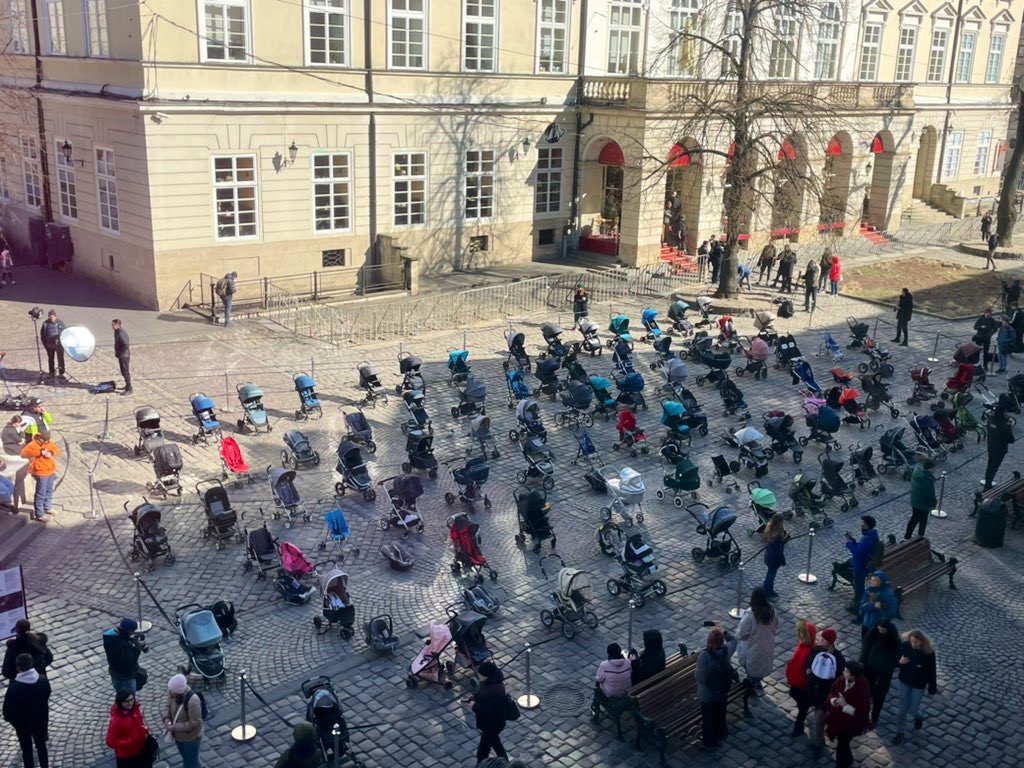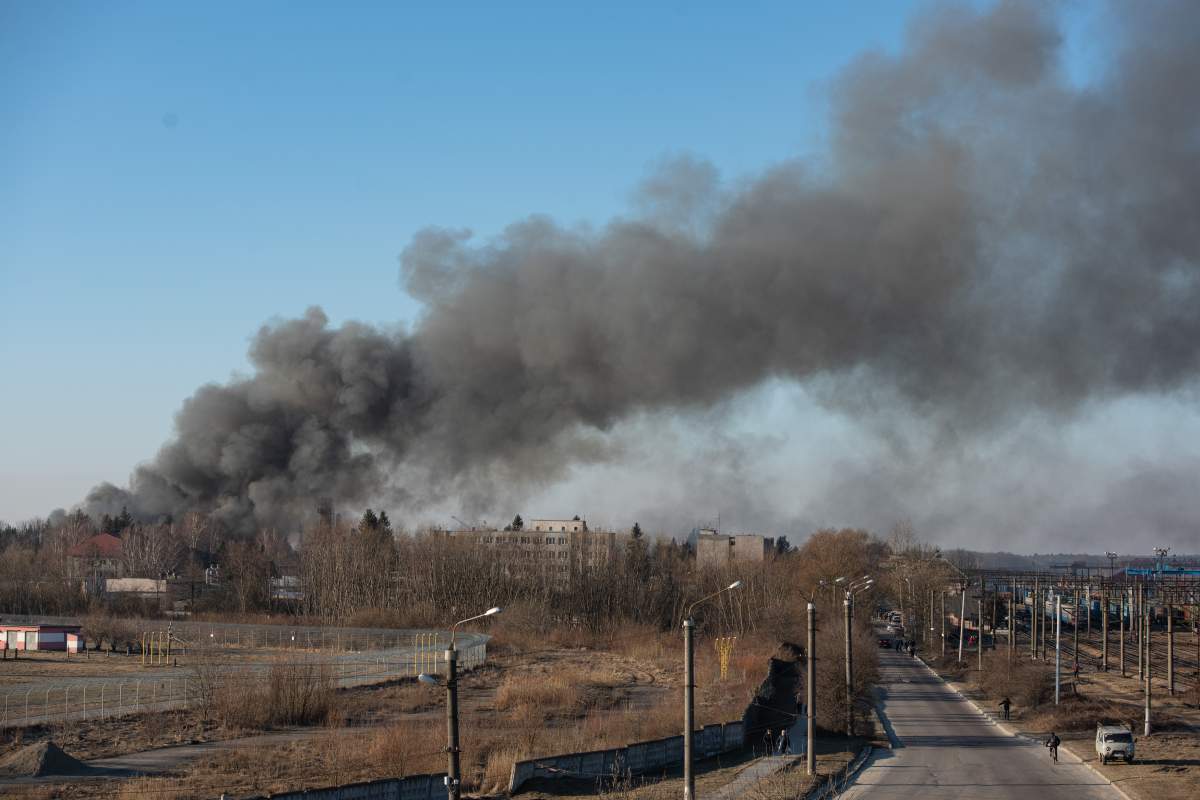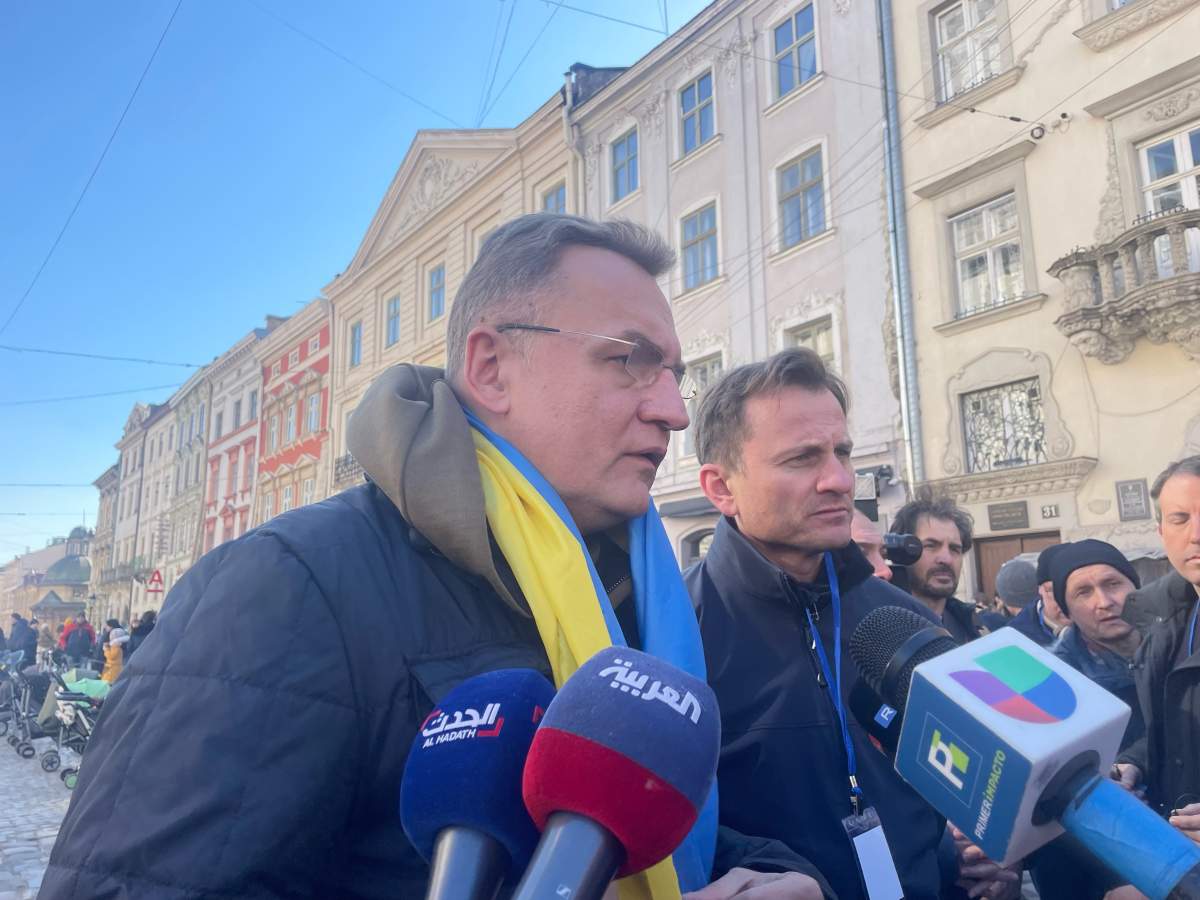One person was injured after Russian missiles struck an airport in the western Ukrainian city of Lviv in an attack that had “no purpose,” the mayor said Friday.

Air raid sirens sounded across the city around 6 a.m. local time as a cloud of smoke billowed out from the direction of Lviv Danylo Halytskyi International Airport, located about six kilometres from the city centre.
A senior official in Lviv’s military later confirmed four missiles had struck an aircraft repair facility at the airport, while two other missiles had been struck down by the Ukrainian Armed Forces.
Maxim Kozitsky, head of Lviv Oblast’s military administration, said the rockets came from the direction of the Black Sea. The two that were intercepted were shot down near Lviv, he said.
One person was injured and had been taken to hospital in a moderate condition, he confirmed.

When asked if the injured person was a civilian or military, Kozitsky said: “There is no military infrastructure operating in the Lviv Oblast.”
Shortly after the missile strike, the roads around the airport were cordoned off by military and checkpoints had been set up, preventing anyone from getting near it.
But it didn’t appear to phase the people of Lviv, who walked by the area on their way to work without giving the huge cloud much more than a passing glance.
Ukraine’s airspace has been closed since the invasion began. However, before the war, Lviv’s airport was one of the busiest in the country – with more than 50 international routes across Europe.

Sadovyi later spoke to the media in Rynok Square, in front of a display of 109 prams – representing every child Ukraine says has been killed so far in the Russian invasion.
When asked what the purpose of the strike on the airport appeared to be, Sadovyi said, through a translator, “there was no purpose.”
“It was pure destruction. That’s what they’re doing right now,” he said.
Sadovyi added there was “nothing precious” inside the facility that was destroyed, as everything had already been moved outside.

Get breaking National news
Sadovyi seemed unconcerned that Lviv was to become increasingly targeted by the Russians, and about whether this marked an escalation in the conflict, but said “the reality of war” was that he did not know where the next target would be.
“Russia has not enough military power to occupy new territories. But they have a lot of missiles,” he said.
“I don’t believe that you can murder 40 million people and destroy hundreds of millions of different facilities and objects.”
Attacks in western Ukraine rare so far
This is only the second major attack in the Lviv region since Russia launched its invasion on Feb. 24. The west, and specifically Lviv, has become a hub for millions of people fleeing the war in other parts of the country.
The first major strike took place on March 13, when Russian missiles targeted Yavoriv military base, near the Polish border and about 50 kilometres from Lviv. Russia fired around 30 cruise missiles at the base, which killed 35 people.
When asked if Lviv remains a safe place for refugees fleeing war in the rest of the country, Sadovyi said “all cities” in Ukraine were in the same situation, and pointed to the people around the square who were “drinking coffee” and going about their day as normal.
“I’m an optimist and I believe in our victory,” he said.
“I believe that one Ukrainian troop equals hundreds of Russian soldiers. Every Ukrainian soldier is like a lion. That’s why I believe in our victory.”
More than 200,000 refugees were currently in Lviv, Sadovyi said, and the refugee crisis was costing the city $1 million per day. Small mobile homes were being built for refugees because “you can’t keep people in schools and kindergartens for too long,” he said.
However, the numbers of those entering the city were now slowing. At the height of the exodus from other centres, the train station was receiving 60,000 people per day, he said, but yesterday there were just 10,000 arrivals.
“Many internally displaced people are starting to choose other cities,” Sadovyi said.
“Today, you are witnessing the birth of the Ukrainian nation. It’s 30 years after the breakup of the Soviet Union, and that was a difficult period of giving birth.”
A man behind Sadovyi held aloft a Ukrainian flag throughout the press conference, before Sadovyi turned and took it off him and draped it around his neck.
Lviv strikes ‘not surprising’
Speaking from Ottawa, retired Canadian Forces lieutenant-general Andrew Leslie said strikes in Lviv and surrounding areas were “not surprising,” explaining that the city holds strategic importance to Russia.
“It is arguably the cultural and if not the spiritual centre of Ukraine,” he said.
“It is led by ferociously independent citizens who were at the forefront of the fight against Putin and his illegal operations and have done so for many years. So it’s probably a thorn in the side of Putin for the time he’s been president, which is well over two decades.”
On Friday, Kozitsky condemned the attack on the “humanitarian hub” that Lviv had become, saying that displaced people seeking refuge were still recovering from shelling in other parts of the country.
He said the area, with its close proximity to the Polish border, was important because it’s “the way we are receiving humanitarian help.”
“The enemy is not fighting the Ukrainian army, they are shelling civilians, kids, women and displaced people,” he said.












Comments
Want to discuss? Please read our Commenting Policy first.